
Institute Of Jainology
Ahimsa Day 2010
20th October 2010
The eight Ahimsa Day was celebrated this year in London’s House of Commons committee Room no 10. The room is steeped in history, its walls having witnessed perhaps thousands of Parliamentary Bills discussed.The program started on time at 7 pm with the room completely filled up with leading members of the UK’s Jain community. As there were some very important bill’s being discussed in the House at the time, the attendance of the Members of Parliament was a little thin.
Mr Barry Gardiner MP Chair of the Labour Parliamentary Friends of India, Ms Pritti Patel, Deputy Chair of the Conservative Friends of India and Lady Dholakia representing Lord Dholakia, the Chair for Liberal Democrat Friends of India were all present as the Co-Hosts for the evening.There were several other MPs in the audience including the Attorney General, Rt Hon Dominic Grieve, and some opposition members.
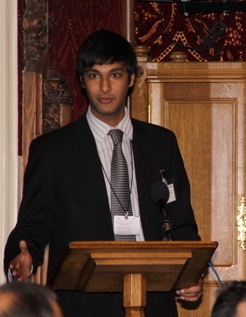 |
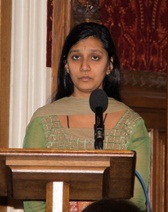 |
| Samir Juthani | Vishita Shah |
Mr Samir Juthani, the compère for the evening introduced himself and invited Vishita Shah to commence the program in Jain tradition by reciting the auspicious Namokar Mantra. The three co- hosts formally welcomed the audience and expressed their pleasure at having the opportunity to host the evening. Dr Harshad Sanghrajka, Institute’s Director & Hon Secretary followed the hosts to welcome the guests on behalf of the Institute. He outlined the history of Ahimsa Day celebration and explained how it had taken on special significance four years ago when United Nations declared 2nd October as Ahimsa Day in honour of Mahatma Gandhi whose birthdate was 2nd October.Professor Sugata Mitra of Newcastle University, our keynote speaker took to the stage. He had obtained a doctorate in Physics, worked in several research institutions, IT Teaching institutions in India before taking up the Professorship in Newcastle. He spoke for just over 30 minutes in very lucid way holding the audience spellbound for the entire address.
He spoke about how when he was an instructor on IT applications, he thought of doing something different. He bought a computer and literally placed in a hole in a wall in one of the Delhi slums expecting the computer to be vandalised in next couple of days. Instead, to his amazement, the slum children had learnt to use the computer and carry out searches on Google - all on their own.
Emboldened by the success of this - he repeated the same experiment in a Tsunami affected village where children did not even have a class room! Once again there was success with children having learnt to use the computer.
On publication of his papers, he was contacted by Newcastle University to set up a much larger experiment in Hyderabad. Here the conditions were more formal with a instructor available not to teach but to ask critical questions to make the children think. Success of these projects prompted the University to try them out in the depressed areas of Newcastle. And as he had expected the children world over have the same curious natures and the ability to challenge what they do not understand.
Professor Mitra’s quest is to create environment for enabling the children in depressed areas to have an opportunity to develop their latent talents and skills in their own way rather than going through a regimented education process which may not offer them the same challenge to their own creativity.
His findings have revolutionised the way in which educationalists think about the role of teachers, and his discovery of “self-organised learning units” (i.e. when children sort themselves out to learn in the most effective way possible- as they will naturally do in the absence of any impediments) have been proven to change the focus, ambition and lives of children all over the world. Professor Mitra, a polymath (genius in many fields), has also harnessed that age-old teaching technique- the power of the grandmother! Through harnessing the internet, he has allowed children from all over the world to be taught English by native speakers (all retired grandmothers).
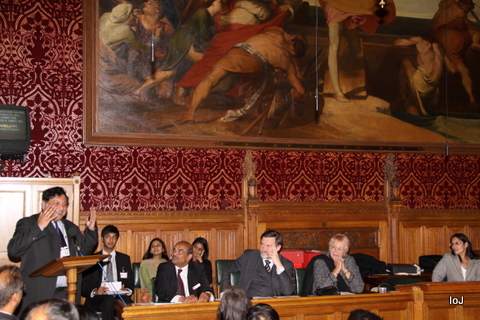
Prof Sugata Mitra had the audience spellbound
He himself finally asked the question - what has all this to do with Ahimsa? His answer was that Hinsa - opposite to Ahimsa in Bengali (his language) means jealousy. That all Hinsa arises because of the difference between the haves and have nots leading to a variety of conflicts. Creating opportunities for the have nots to rise in the world will certainly reduce jealousy and evolve Ahimsa.
Prof Mitra was then requested to launch the Institute’s publication ‘Jain Tales’ 2nd in the National Curriculum Series of Jain Religious Education. (This book has been reviewed elsewhere on this site.
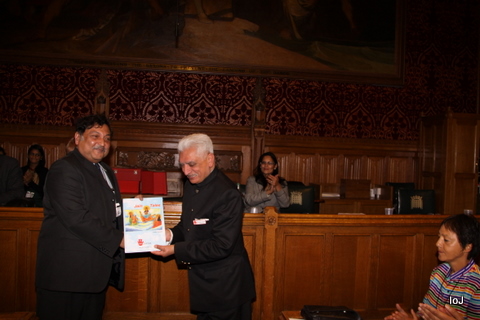
Professor Mitra Launches the book Jain Tales
Jaysukh Mehta, Institute’s Director and Co-ordinator of the Ahimsa Day program then spoke about how the Directors’ decide on the criteria for selecting the awardees. In the earlier years, the Directors had selected personalities who had woven ahimsa in their life styles. Directors had then considered refocusing on this criteria and thought that it may be more appropriate to make the awards to those who create an awareness of the noble tenets of Jain philosophy like Ahimsa and Anekantvad in the Western world. It was this awareness that would one day bring peace and stability in this strife torn modern society.
These thoughts had resulted in Professor Padmanabh Jaini, the most renowned scholar in Jain academia being awared the 2009 Ahimsa Award. He then announced the recipient of the 2010 Ahimsa Award as Professor Nalini Balbir of Sorbonne Nouvelle, University of Paris.She has been the Professor of Indian Studies there since 1988. Even though there is no established Jain Centre of Studies in Paris, it remains one of the most important centres of Jain scholarship outside India and she is currently maintaining that reputation with her own scholarship.
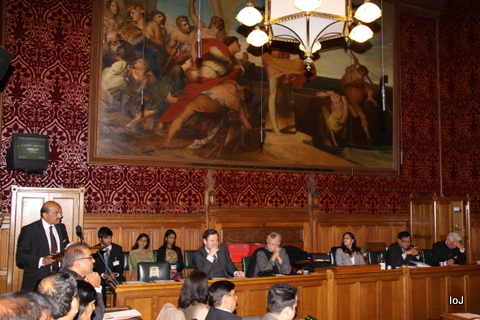
The Dignitaries on the Head Table
She has demonstrated her scholarship not only for Jainism but also for Buddhism. Over the past decade, she has edited the catalogue of the Collection of Jain manuscripts at the British Library. Currently she is the editor of the JAINpedia project - which is expected to become a standard reference for Jainism and will certainly inspire many more to understand Jain philosophy. The Institute has recognised her contribution in creating a deeper understanding of Jain philosophy and its principles not only in France but throughout the Western academic world and Jaysukh Mehta stated that the Institute felt honoured that Professor Nalini Balbir had accepted the Ahimsa Award for the year 2010.
Dr Harshad Sanghrajka then presented the Award trophy to Professor Balbir.
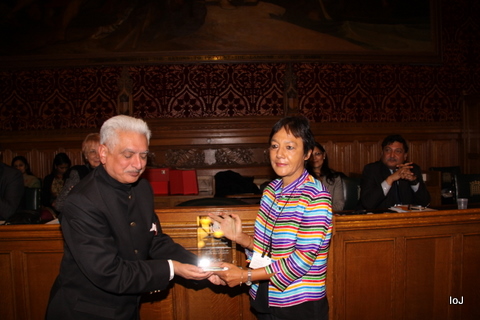
Dr Harshad Sanghrajka Presenting the Award to Prof Balbir
In response, Professor Balbir in her humility said that having seen the illustrious list names of the past recipients she did not feel that she deserved to receive the award and done so reluctantly at the insistence of the Directors of the Institute. She then went through her career outlining some very major achievements. She finished the address with the details of the JAINpedia project and her personal involvement with it. Click here to see her full address.
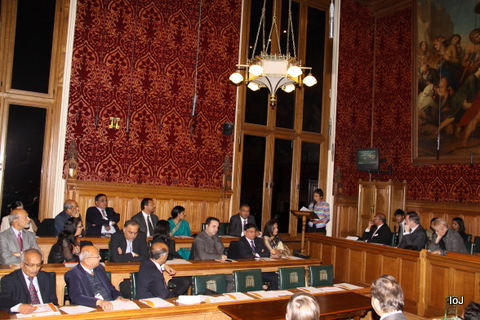
Professor Nalini Balbir Addressing the Audience
She was followed by Dr Mehool Sanghrajka who outlined the progress being made on the JAINpedia project. He gave details of the exhibitions of the Jain manuscripts mounted by both Victoria & Albert museum and British Library. It was a tremendous achievement to get both these highly prestigious venues to mount such exhibitions and he requested all Jain community leaders to persuade their members to take advantage of these exhibitions and visit them.
To close the evening, Hemali Shah gave the vote of thanks in particular to the Keynote speaker, Prof Sugata Mitra and the three Co-Hosts. She made a particular reference to Mr Stephen Pound MP who could not be present that evening and his office staff who had assisted in securing the venue for the evening. The House of Commons Events Team was also thanked for organising the furniture in the room.

Hemali Shah Giving the Vote of Thanks
The evening finished with an opportunity for all the guests to mingle and to speak to Professor Mitra and Professor Balbir, as well as our hosts.
PHOTO GALLERY
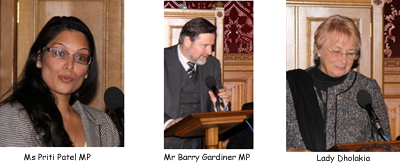
Members of the Audience
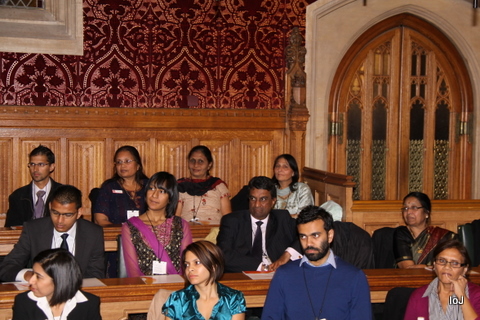
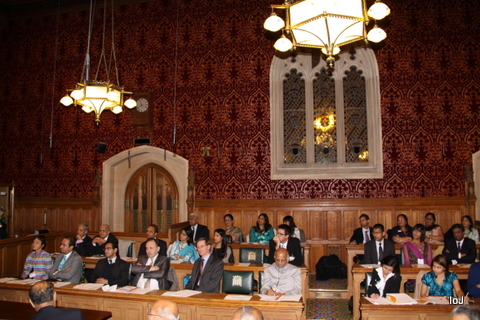

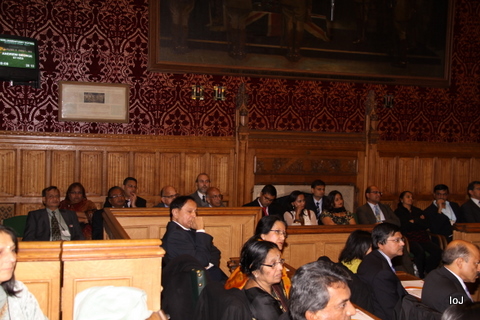
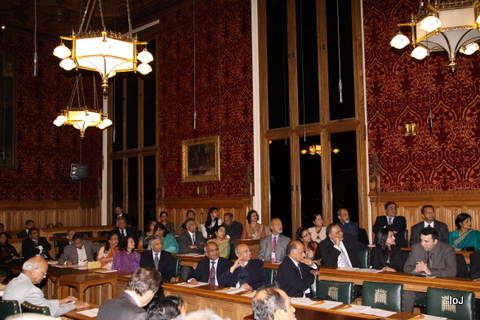
I o J Team
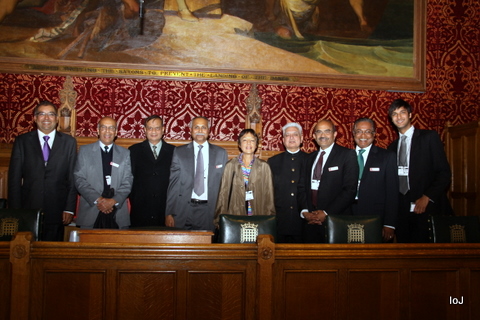
IoJ Team with Professor Nalini Balbir